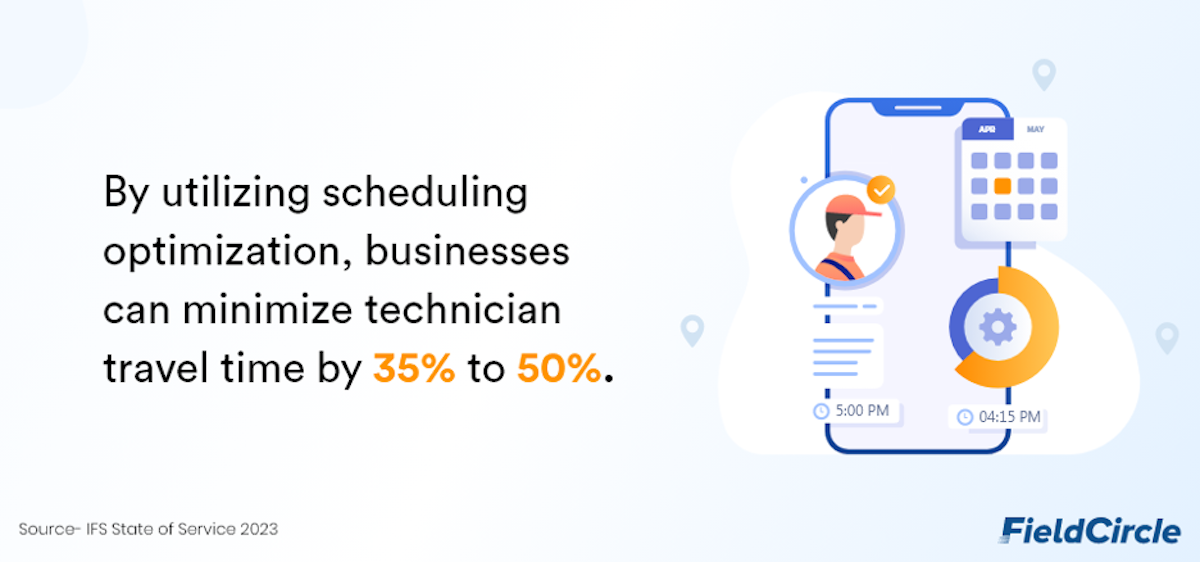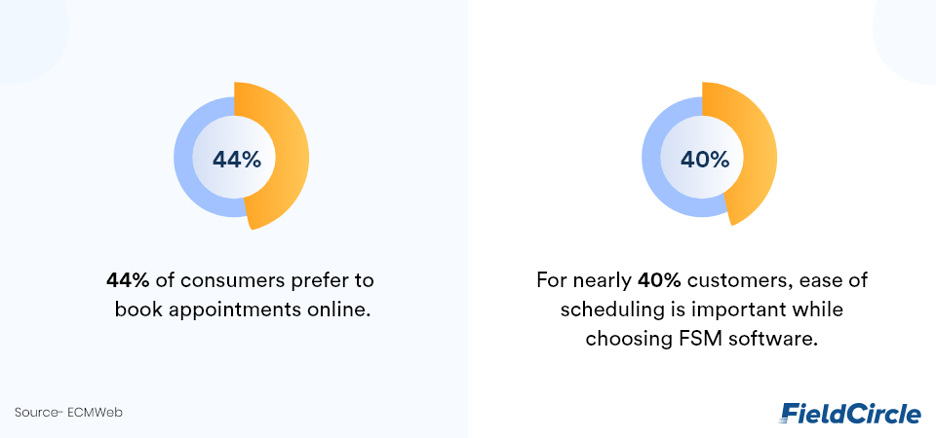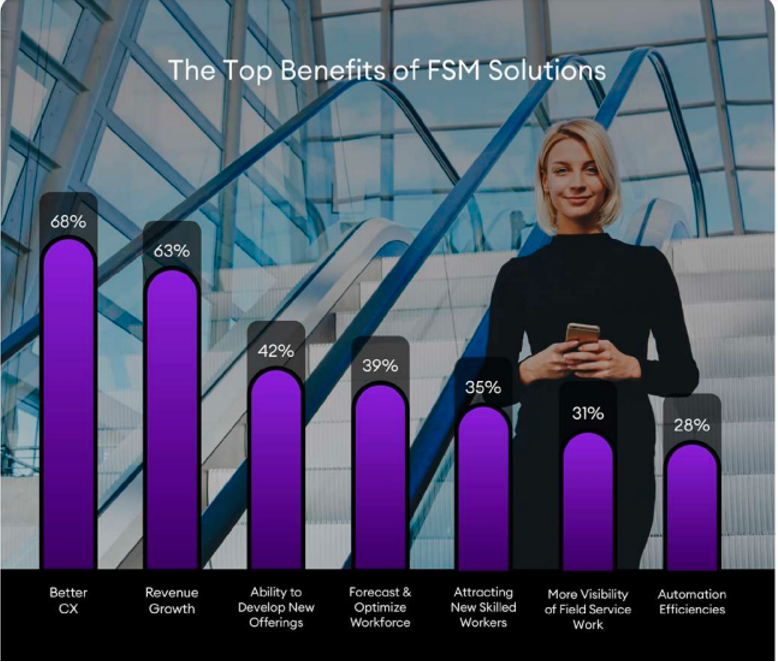
The Top Benefits of Using Scheduling Software for Small Business Owners
"Despite 40% of service companies intending to do so, scheduling software remains unimplemented in the vast majority of them. Often, the reasoning behind this lack of adoption is the belief that their people can do it better than the system until they learn that their employees are managing schedules 30% sub-optimally."
It's challenging to keep track of all the appointments, meetings, and deadlines while simultaneously running a business.
This is where scheduling software comes in. Scheduling software can be a game-changer for small business owners, allowing them to streamline their operations, improve their efficiency, and save time. According to a survey conducted by GetApp, businesses that use scheduling software saw a 33% increase in appointment volume and a 27% reduction in no-shows.
But the benefits of scheduling software go beyond just time management. It can also improve customer satisfaction, increase revenue, and provide valuable insights into your business operations.
In today's fast-paced digital age, scheduling software is not just a luxury, but a necessity for small business owners looking to stay competitive and grow their businesses. So, what are you waiting for? Let's dive into the top benefits of using the scheduling software for small business owners.
Five Key Advantages of Utilizing Scheduling Software for Small Business Owners
As a small business owner, managing multiple tasks and deadlines can be overwhelming. Scheduling software can streamline the process of organizing appointments, meetings, and tasks. By using scheduling or a field service CRM software, small business owners can benefit from increased productivity, efficiency, and improved customer satisfaction. In this article, we'll explore the five top benefits of using scheduling software and provide real-life examples of how it can help businesses overcome common challenges.
1. Improved Time Management and Efficiency
Small business owners often wear multiple hats and manage several tasks simultaneously. Scheduling software can help optimize the use of time by automating tasks, reducing errors, and providing real-time updates on appointments and deadlines.
According to a study by Doodle, the average employee spends 4.5 hours a week scheduling meetings, which equates to over 11 days a year. Through the automation of the scheduling process, businesses can boost efficiency and save valuable time. Whereas, by utilizing scheduling optimization, businesses can minimize technician travel time by 35% to 50%, resulting in a substantial reduction in their carbon emissions.

To bring this benefit into practice, businesses can set up automatic reminders for upcoming appointments and tasks, and use features such as calendar synchronization and automatic time zone adjustments to ensure smooth scheduling across different time zones. Scheduling software can also eliminate the need for manual data entry, which can reduce errors and save time.
2. Enhanced Customer Experience
Customer satisfaction is a critical factor in the success of small businesses. By using scheduling software, businesses can provide customers with a seamless booking experience, improving their overall satisfaction. According to a study by ECMWeb, 44% of consumers prefer to book appointments online, and when choosing a field service company, nearly 40% of customers say that the convenience of scheduling is important.

To bring this benefit into practice, businesses can set up a scheduling system that allows customers to book appointments online, select their preferred time slot, and receive an automatic confirmation and reminder messages.
Scheduling software can also provide real-time availability updates, allowing customers to see the available time slots and book accordingly.
3. Improved Staff Management and Communication
Managing staff schedules and communication can be challenging for small business owners, especially those with remote or part-time staff. Scheduling software can help streamline staff management by providing a centralized scheduling system, facilitating communication between staff, and reducing scheduling conflicts.
To bring this benefit into practice, businesses can set up a scheduling system that allows staff to access and manage their schedules remotely, view shift swaps and time-off requests, and receive automatic updates on schedule changes.
Scheduling software can also help managers communicate with staff by providing a messaging system or chat functionality, reducing the need for phone calls or emails.
4. Increased Revenue and Productivity
According to a study by IFS, the second major advantage validates the potential for businesses to utilize such services as a source of revenue.

Source: State of Service 2023
Scheduling software can help small businesses increase revenue and productivity by optimizing the use of time and resources. By reducing scheduling conflicts, automating tasks, and improving staff management, businesses can save time and improve productivity.
To bring this benefit into practice, businesses can use scheduling software to optimize their schedules, reduce downtime between appointments, and increase staff utilization. Scheduling software can also help businesses identify peak times and adjust staffing levels accordingly, improving efficiency and revenue.
5. Data and Analytics
Scheduling software can provide businesses with valuable data and analytics on appointment bookings, staff utilization, and customer behavior. By tracking and analyzing this data, businesses can identify trends, optimize their schedules, and improve their overall performance.
To bring this benefit into practice, businesses can use scheduling software to track and analyze data on appointment bookings, staff utilization, and customer behavior. They can use this data to identify trends, such as peak booking times, popular services, and staff availability. This information can then be used to optimize scheduling, adjust staffing levels, and improve overall performance.
Conclusion
Scheduling software has become an essential tool for small business owners looking to optimize their operations and stay competitive. By automating the scheduling process, small business owners can save time, reduce errors, and increase productivity.
Furthermore, top-rated field service scheduling software can help streamline dispatch and route optimization, allowing businesses to better manage their field service operations. In today's fast-paced business environment, where efficiency and customer satisfaction are critical, investing in scheduling software is a smart approach.
By leveraging the benefits of scheduling software, small business owners can improve their bottom line, enhance their customer service, and gain a competitive edge.
Photos: Supplied








